Strategic Marketing Report: Analysis and Strategies for Deloitte Malta
VerifiedAdded on 2021/02/21
|15
|5058
|184
Report
AI Summary
This report provides a comprehensive analysis of strategic marketing, focusing on its role within an organization and its relationship with corporate strategy, using Deloitte Malta as a case study. It delves into the process of developing marketing strategies, evaluating internal and external environmental factors, and integrating these analyses to inform strategic decisions. The report examines various approaches to internal analysis, such as performance-based and value chain approaches, and external analysis, including macro and micro environmental factors. Furthermore, it explores how these analyses are integrated to influence marketing strategies and competitive positioning. The report also identifies strategies for achieving competitive advantage and analyzes marketing communication strategies, offering insights into their application and implementation within an organization. The conclusion summarizes the key findings and implications of the analysis.
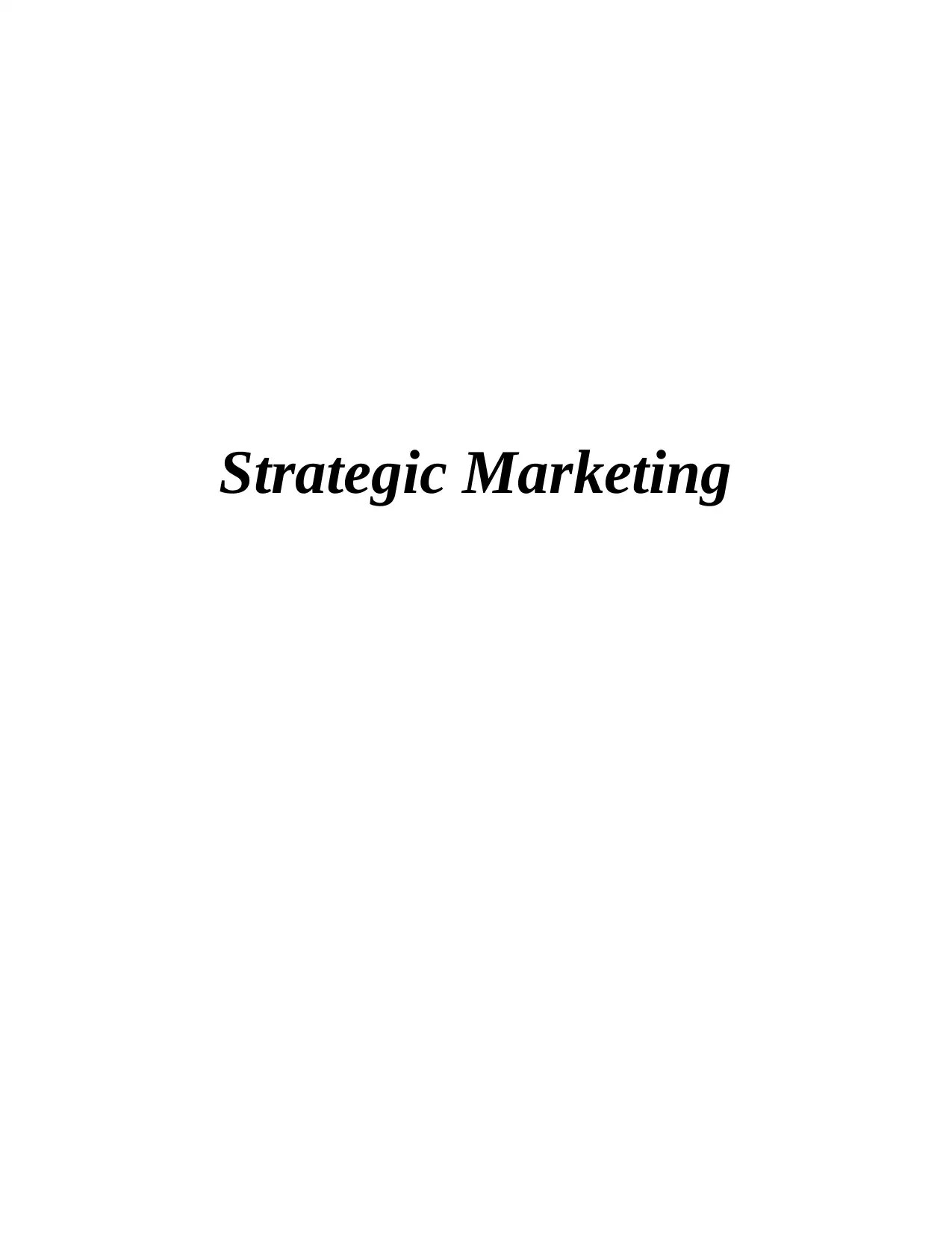
Strategic Marketing
Paraphrase This Document
Need a fresh take? Get an instant paraphrase of this document with our AI Paraphraser
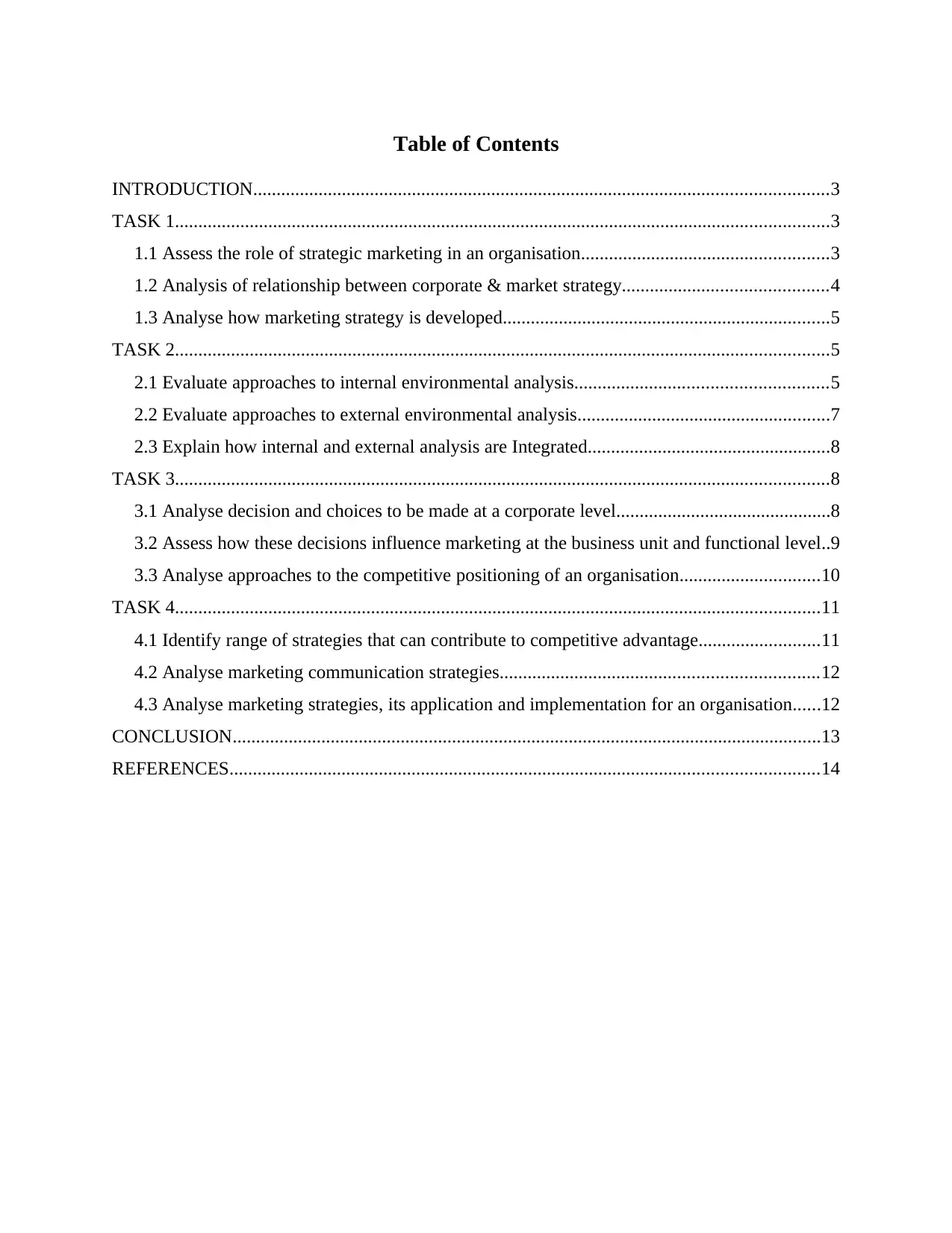
Table of Contents
INTRODUCTION...........................................................................................................................3
TASK 1............................................................................................................................................3
1.1 Assess the role of strategic marketing in an organisation.....................................................3
1.2 Analysis of relationship between corporate & market strategy............................................4
1.3 Analyse how marketing strategy is developed......................................................................5
TASK 2............................................................................................................................................5
2.1 Evaluate approaches to internal environmental analysis......................................................5
2.2 Evaluate approaches to external environmental analysis......................................................7
2.3 Explain how internal and external analysis are Integrated....................................................8
TASK 3............................................................................................................................................8
3.1 Analyse decision and choices to be made at a corporate level..............................................8
3.2 Assess how these decisions influence marketing at the business unit and functional level..9
3.3 Analyse approaches to the competitive positioning of an organisation..............................10
TASK 4..........................................................................................................................................11
4.1 Identify range of strategies that can contribute to competitive advantage..........................11
4.2 Analyse marketing communication strategies....................................................................12
4.3 Analyse marketing strategies, its application and implementation for an organisation......12
CONCLUSION..............................................................................................................................13
REFERENCES..............................................................................................................................14
INTRODUCTION...........................................................................................................................3
TASK 1............................................................................................................................................3
1.1 Assess the role of strategic marketing in an organisation.....................................................3
1.2 Analysis of relationship between corporate & market strategy............................................4
1.3 Analyse how marketing strategy is developed......................................................................5
TASK 2............................................................................................................................................5
2.1 Evaluate approaches to internal environmental analysis......................................................5
2.2 Evaluate approaches to external environmental analysis......................................................7
2.3 Explain how internal and external analysis are Integrated....................................................8
TASK 3............................................................................................................................................8
3.1 Analyse decision and choices to be made at a corporate level..............................................8
3.2 Assess how these decisions influence marketing at the business unit and functional level..9
3.3 Analyse approaches to the competitive positioning of an organisation..............................10
TASK 4..........................................................................................................................................11
4.1 Identify range of strategies that can contribute to competitive advantage..........................11
4.2 Analyse marketing communication strategies....................................................................12
4.3 Analyse marketing strategies, its application and implementation for an organisation......12
CONCLUSION..............................................................................................................................13
REFERENCES..............................................................................................................................14

INTRODUCTION
Strategic marketing is one of the broader concept which allows any firm to differentiates
itself from its competitors by focusing on its strength to provide constant better value to an actual
customer's. Role of strategic marketing is aim to identify flaws into the marketing process and
recommend strategies to make it optimised or advantageous (Aghazadeh, 2015). Moreover,
strategic marketing is the long term, forward looking approach to initiates planning with a
fundamental goals of achieving a sustainable competitive benefits. This report will be discussed
on Deloitte is the DTTL member firm in Malta and also refers to a civil partnership, constituted
between limited liability company and its affiliated operating entities. Deloitte Malta deals with
consumer, energy resources and financial services. Report is also based on principles of the
strategic marketing, understanding on how to carry out strategic marketing analysis, strategic
marketing decision along with different range of marketing strategies, its application or
implementation. Also, assessment will try to be focus on differentiation between corporate &
marketing strategy at an optimised context. A kind of critical analysis will be put down to the
process of understanding.
MAIN BODY
TASK 1
1.1 Assess the role of strategic marketing in an organisation
Marketing strategy is defined as the comprehensive plan formulated particularly for clear
achievement of set marketing objectives of the firm. It is helpful to give blueprint for attainment
of the marketing objectives and building block for the marketing plan. Marketing strategy helps
the firm to concentrates on its scarce resources on a basis of best suitable opportunities with aim
to increase the sales. In context of Deloitte Malta, firm is active for marketing of its product and
consistently performs planning & activities to makes it highly perfect. Marketing strategy try to
force companies to finding flaw into the marketing and give emphasis on the development of a
plan to market the product effectively (Baker, 2016). For Deloitte, marketing strategy is need to
be accurate, so that firm should reached to customer and places with them its products into the
defined manner. Marketing strategy is comes out of plan made for establishment of product to
the customer. A marketing strategy is designed by: choosing of the target market which means to
Strategic marketing is one of the broader concept which allows any firm to differentiates
itself from its competitors by focusing on its strength to provide constant better value to an actual
customer's. Role of strategic marketing is aim to identify flaws into the marketing process and
recommend strategies to make it optimised or advantageous (Aghazadeh, 2015). Moreover,
strategic marketing is the long term, forward looking approach to initiates planning with a
fundamental goals of achieving a sustainable competitive benefits. This report will be discussed
on Deloitte is the DTTL member firm in Malta and also refers to a civil partnership, constituted
between limited liability company and its affiliated operating entities. Deloitte Malta deals with
consumer, energy resources and financial services. Report is also based on principles of the
strategic marketing, understanding on how to carry out strategic marketing analysis, strategic
marketing decision along with different range of marketing strategies, its application or
implementation. Also, assessment will try to be focus on differentiation between corporate &
marketing strategy at an optimised context. A kind of critical analysis will be put down to the
process of understanding.
MAIN BODY
TASK 1
1.1 Assess the role of strategic marketing in an organisation
Marketing strategy is defined as the comprehensive plan formulated particularly for clear
achievement of set marketing objectives of the firm. It is helpful to give blueprint for attainment
of the marketing objectives and building block for the marketing plan. Marketing strategy helps
the firm to concentrates on its scarce resources on a basis of best suitable opportunities with aim
to increase the sales. In context of Deloitte Malta, firm is active for marketing of its product and
consistently performs planning & activities to makes it highly perfect. Marketing strategy try to
force companies to finding flaw into the marketing and give emphasis on the development of a
plan to market the product effectively (Baker, 2016). For Deloitte, marketing strategy is need to
be accurate, so that firm should reached to customer and places with them its products into the
defined manner. Marketing strategy is comes out of plan made for establishment of product to
the customer. A marketing strategy is designed by: choosing of the target market which means to
⊘ This is a preview!⊘
Do you want full access?
Subscribe today to unlock all pages.

Trusted by 1+ million students worldwide
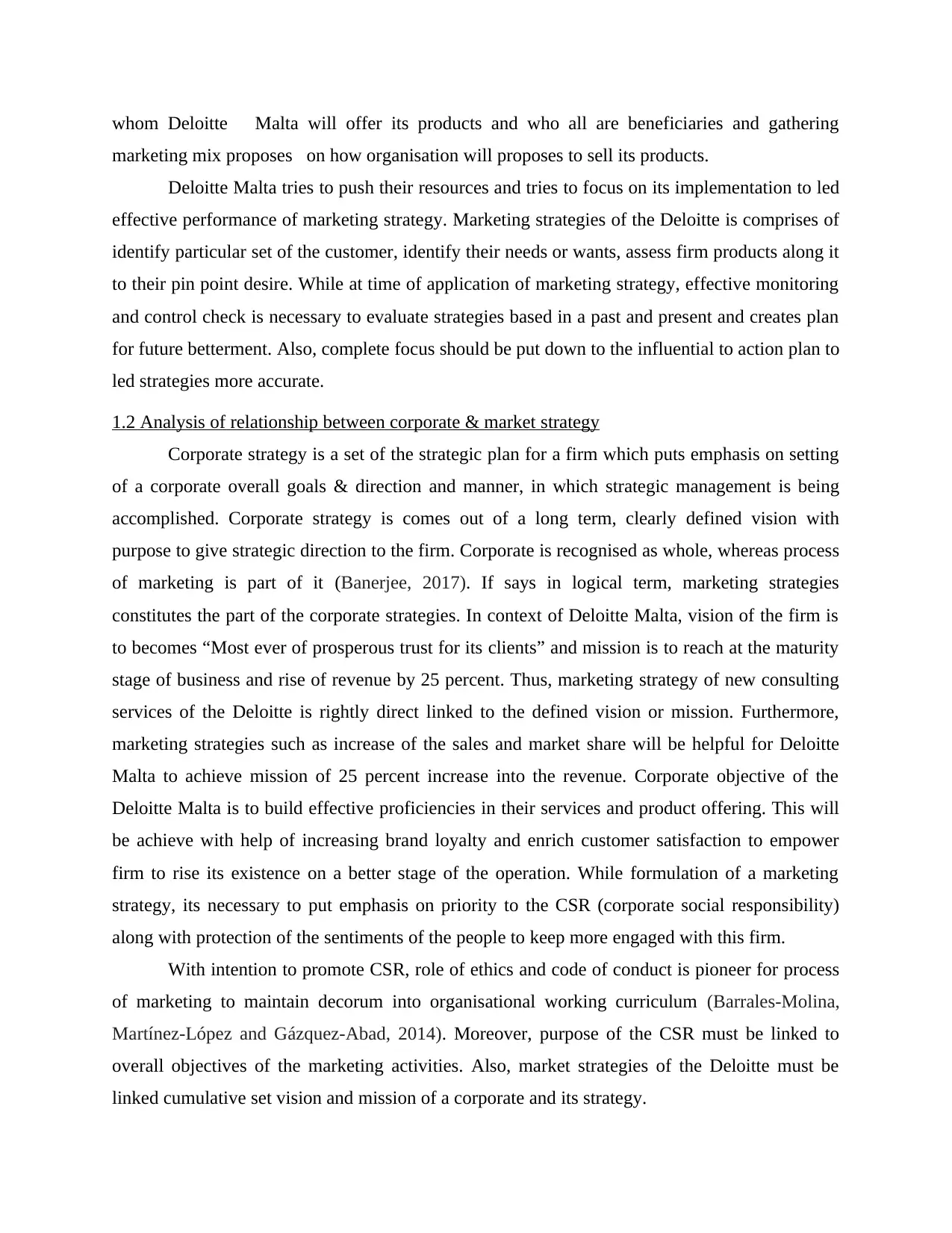
whom Deloitte Malta will offer its products and who all are beneficiaries and gathering
marketing mix proposes on how organisation will proposes to sell its products.
Deloitte Malta tries to push their resources and tries to focus on its implementation to led
effective performance of marketing strategy. Marketing strategies of the Deloitte is comprises of
identify particular set of the customer, identify their needs or wants, assess firm products along it
to their pin point desire. While at time of application of marketing strategy, effective monitoring
and control check is necessary to evaluate strategies based in a past and present and creates plan
for future betterment. Also, complete focus should be put down to the influential to action plan to
led strategies more accurate.
1.2 Analysis of relationship between corporate & market strategy
Corporate strategy is a set of the strategic plan for a firm which puts emphasis on setting
of a corporate overall goals & direction and manner, in which strategic management is being
accomplished. Corporate strategy is comes out of a long term, clearly defined vision with
purpose to give strategic direction to the firm. Corporate is recognised as whole, whereas process
of marketing is part of it (Banerjee, 2017). If says in logical term, marketing strategies
constitutes the part of the corporate strategies. In context of Deloitte Malta, vision of the firm is
to becomes “Most ever of prosperous trust for its clients” and mission is to reach at the maturity
stage of business and rise of revenue by 25 percent. Thus, marketing strategy of new consulting
services of the Deloitte is rightly direct linked to the defined vision or mission. Furthermore,
marketing strategies such as increase of the sales and market share will be helpful for Deloitte
Malta to achieve mission of 25 percent increase into the revenue. Corporate objective of the
Deloitte Malta is to build effective proficiencies in their services and product offering. This will
be achieve with help of increasing brand loyalty and enrich customer satisfaction to empower
firm to rise its existence on a better stage of the operation. While formulation of a marketing
strategy, its necessary to put emphasis on priority to the CSR (corporate social responsibility)
along with protection of the sentiments of the people to keep more engaged with this firm.
With intention to promote CSR, role of ethics and code of conduct is pioneer for process
of marketing to maintain decorum into organisational working curriculum (Barrales‐Molina,
Martínez‐López and Gázquez‐Abad, 2014). Moreover, purpose of the CSR must be linked to
overall objectives of the marketing activities. Also, market strategies of the Deloitte must be
linked cumulative set vision and mission of a corporate and its strategy.
marketing mix proposes on how organisation will proposes to sell its products.
Deloitte Malta tries to push their resources and tries to focus on its implementation to led
effective performance of marketing strategy. Marketing strategies of the Deloitte is comprises of
identify particular set of the customer, identify their needs or wants, assess firm products along it
to their pin point desire. While at time of application of marketing strategy, effective monitoring
and control check is necessary to evaluate strategies based in a past and present and creates plan
for future betterment. Also, complete focus should be put down to the influential to action plan to
led strategies more accurate.
1.2 Analysis of relationship between corporate & market strategy
Corporate strategy is a set of the strategic plan for a firm which puts emphasis on setting
of a corporate overall goals & direction and manner, in which strategic management is being
accomplished. Corporate strategy is comes out of a long term, clearly defined vision with
purpose to give strategic direction to the firm. Corporate is recognised as whole, whereas process
of marketing is part of it (Banerjee, 2017). If says in logical term, marketing strategies
constitutes the part of the corporate strategies. In context of Deloitte Malta, vision of the firm is
to becomes “Most ever of prosperous trust for its clients” and mission is to reach at the maturity
stage of business and rise of revenue by 25 percent. Thus, marketing strategy of new consulting
services of the Deloitte is rightly direct linked to the defined vision or mission. Furthermore,
marketing strategies such as increase of the sales and market share will be helpful for Deloitte
Malta to achieve mission of 25 percent increase into the revenue. Corporate objective of the
Deloitte Malta is to build effective proficiencies in their services and product offering. This will
be achieve with help of increasing brand loyalty and enrich customer satisfaction to empower
firm to rise its existence on a better stage of the operation. While formulation of a marketing
strategy, its necessary to put emphasis on priority to the CSR (corporate social responsibility)
along with protection of the sentiments of the people to keep more engaged with this firm.
With intention to promote CSR, role of ethics and code of conduct is pioneer for process
of marketing to maintain decorum into organisational working curriculum (Barrales‐Molina,
Martínez‐López and Gázquez‐Abad, 2014). Moreover, purpose of the CSR must be linked to
overall objectives of the marketing activities. Also, market strategies of the Deloitte must be
linked cumulative set vision and mission of a corporate and its strategy.
Paraphrase This Document
Need a fresh take? Get an instant paraphrase of this document with our AI Paraphraser
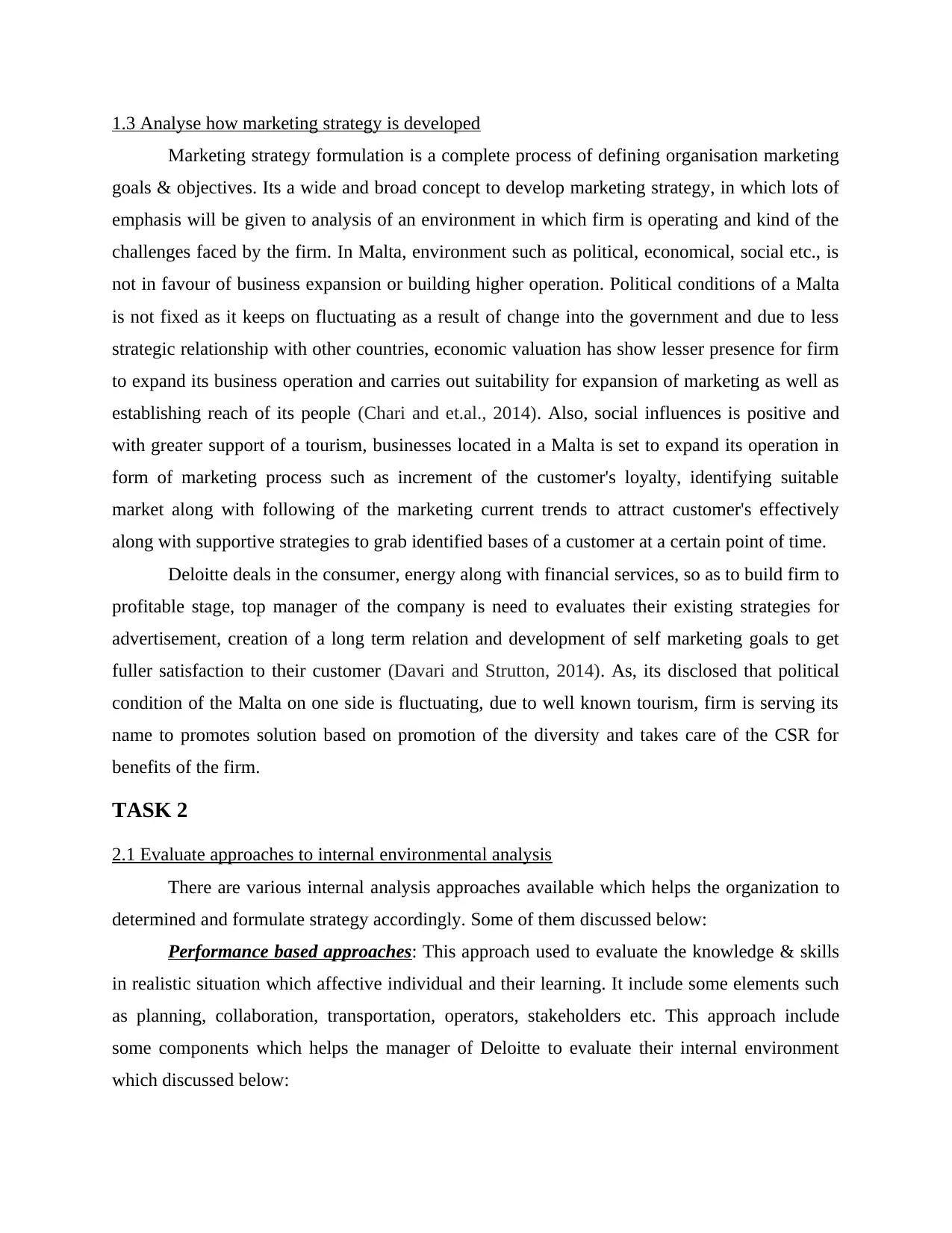
1.3 Analyse how marketing strategy is developed
Marketing strategy formulation is a complete process of defining organisation marketing
goals & objectives. Its a wide and broad concept to develop marketing strategy, in which lots of
emphasis will be given to analysis of an environment in which firm is operating and kind of the
challenges faced by the firm. In Malta, environment such as political, economical, social etc., is
not in favour of business expansion or building higher operation. Political conditions of a Malta
is not fixed as it keeps on fluctuating as a result of change into the government and due to less
strategic relationship with other countries, economic valuation has show lesser presence for firm
to expand its business operation and carries out suitability for expansion of marketing as well as
establishing reach of its people (Chari and et.al., 2014). Also, social influences is positive and
with greater support of a tourism, businesses located in a Malta is set to expand its operation in
form of marketing process such as increment of the customer's loyalty, identifying suitable
market along with following of the marketing current trends to attract customer's effectively
along with supportive strategies to grab identified bases of a customer at a certain point of time.
Deloitte deals in the consumer, energy along with financial services, so as to build firm to
profitable stage, top manager of the company is need to evaluates their existing strategies for
advertisement, creation of a long term relation and development of self marketing goals to get
fuller satisfaction to their customer (Davari and Strutton, 2014). As, its disclosed that political
condition of the Malta on one side is fluctuating, due to well known tourism, firm is serving its
name to promotes solution based on promotion of the diversity and takes care of the CSR for
benefits of the firm.
TASK 2
2.1 Evaluate approaches to internal environmental analysis
There are various internal analysis approaches available which helps the organization to
determined and formulate strategy accordingly. Some of them discussed below:
Performance based approaches: This approach used to evaluate the knowledge & skills
in realistic situation which affective individual and their learning. It include some elements such
as planning, collaboration, transportation, operators, stakeholders etc. This approach include
some components which helps the manager of Deloitte to evaluate their internal environment
which discussed below:
Marketing strategy formulation is a complete process of defining organisation marketing
goals & objectives. Its a wide and broad concept to develop marketing strategy, in which lots of
emphasis will be given to analysis of an environment in which firm is operating and kind of the
challenges faced by the firm. In Malta, environment such as political, economical, social etc., is
not in favour of business expansion or building higher operation. Political conditions of a Malta
is not fixed as it keeps on fluctuating as a result of change into the government and due to less
strategic relationship with other countries, economic valuation has show lesser presence for firm
to expand its business operation and carries out suitability for expansion of marketing as well as
establishing reach of its people (Chari and et.al., 2014). Also, social influences is positive and
with greater support of a tourism, businesses located in a Malta is set to expand its operation in
form of marketing process such as increment of the customer's loyalty, identifying suitable
market along with following of the marketing current trends to attract customer's effectively
along with supportive strategies to grab identified bases of a customer at a certain point of time.
Deloitte deals in the consumer, energy along with financial services, so as to build firm to
profitable stage, top manager of the company is need to evaluates their existing strategies for
advertisement, creation of a long term relation and development of self marketing goals to get
fuller satisfaction to their customer (Davari and Strutton, 2014). As, its disclosed that political
condition of the Malta on one side is fluctuating, due to well known tourism, firm is serving its
name to promotes solution based on promotion of the diversity and takes care of the CSR for
benefits of the firm.
TASK 2
2.1 Evaluate approaches to internal environmental analysis
There are various internal analysis approaches available which helps the organization to
determined and formulate strategy accordingly. Some of them discussed below:
Performance based approaches: This approach used to evaluate the knowledge & skills
in realistic situation which affective individual and their learning. It include some elements such
as planning, collaboration, transportation, operators, stakeholders etc. This approach include
some components which helps the manager of Deloitte to evaluate their internal environment
which discussed below:
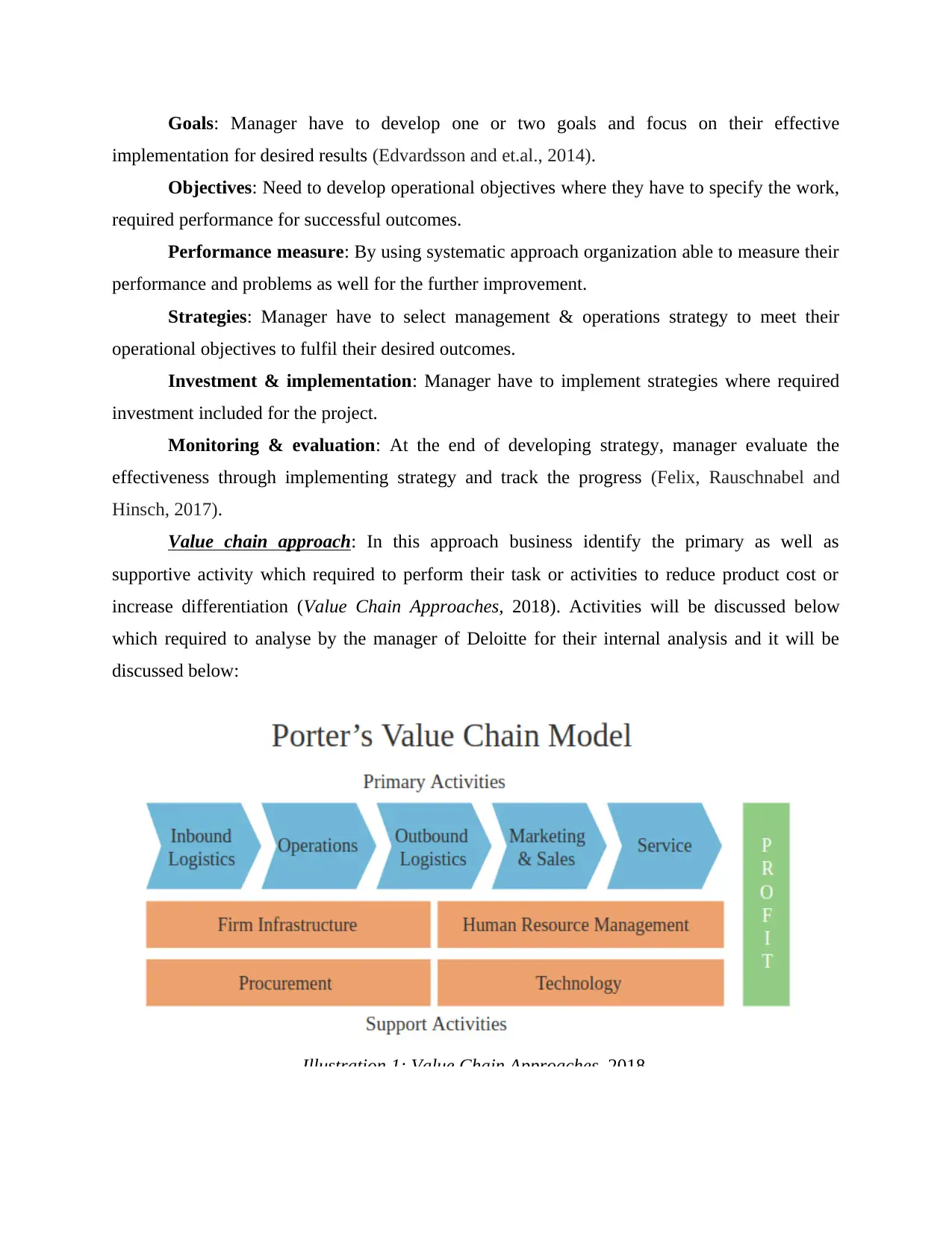
Goals: Manager have to develop one or two goals and focus on their effective
implementation for desired results (Edvardsson and et.al., 2014).
Objectives: Need to develop operational objectives where they have to specify the work,
required performance for successful outcomes.
Performance measure: By using systematic approach organization able to measure their
performance and problems as well for the further improvement.
Strategies: Manager have to select management & operations strategy to meet their
operational objectives to fulfil their desired outcomes.
Investment & implementation: Manager have to implement strategies where required
investment included for the project.
Monitoring & evaluation: At the end of developing strategy, manager evaluate the
effectiveness through implementing strategy and track the progress (Felix, Rauschnabel and
Hinsch, 2017).
Value chain approach: In this approach business identify the primary as well as
supportive activity which required to perform their task or activities to reduce product cost or
increase differentiation (Value Chain Approaches, 2018). Activities will be discussed below
which required to analyse by the manager of Deloitte for their internal analysis and it will be
discussed below:
Illustration 1: Value Chain Approaches, 2018.
implementation for desired results (Edvardsson and et.al., 2014).
Objectives: Need to develop operational objectives where they have to specify the work,
required performance for successful outcomes.
Performance measure: By using systematic approach organization able to measure their
performance and problems as well for the further improvement.
Strategies: Manager have to select management & operations strategy to meet their
operational objectives to fulfil their desired outcomes.
Investment & implementation: Manager have to implement strategies where required
investment included for the project.
Monitoring & evaluation: At the end of developing strategy, manager evaluate the
effectiveness through implementing strategy and track the progress (Felix, Rauschnabel and
Hinsch, 2017).
Value chain approach: In this approach business identify the primary as well as
supportive activity which required to perform their task or activities to reduce product cost or
increase differentiation (Value Chain Approaches, 2018). Activities will be discussed below
which required to analyse by the manager of Deloitte for their internal analysis and it will be
discussed below:
Illustration 1: Value Chain Approaches, 2018.
⊘ This is a preview!⊘
Do you want full access?
Subscribe today to unlock all pages.

Trusted by 1+ million students worldwide
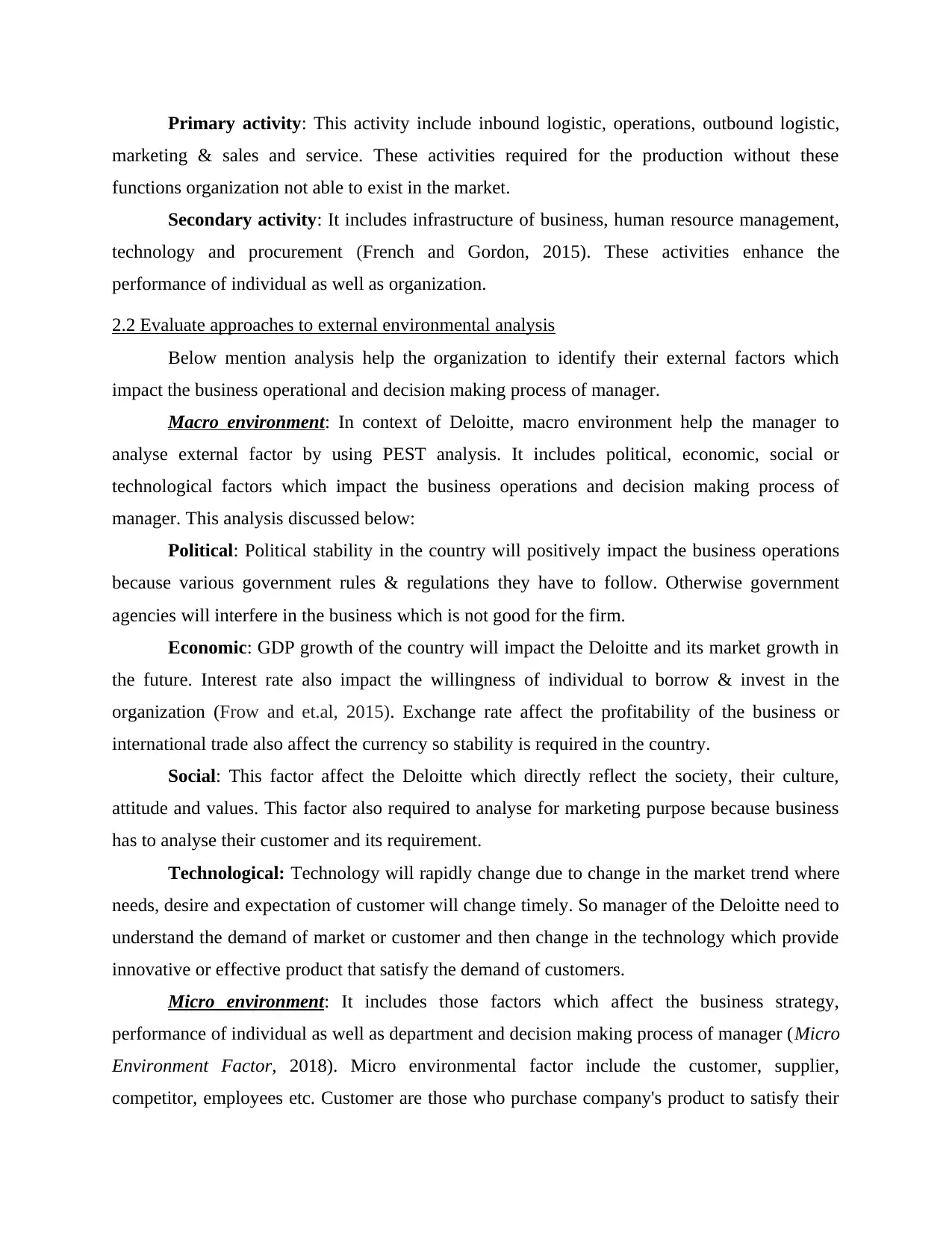
Primary activity: This activity include inbound logistic, operations, outbound logistic,
marketing & sales and service. These activities required for the production without these
functions organization not able to exist in the market.
Secondary activity: It includes infrastructure of business, human resource management,
technology and procurement (French and Gordon, 2015). These activities enhance the
performance of individual as well as organization.
2.2 Evaluate approaches to external environmental analysis
Below mention analysis help the organization to identify their external factors which
impact the business operational and decision making process of manager.
Macro environment: In context of Deloitte, macro environment help the manager to
analyse external factor by using PEST analysis. It includes political, economic, social or
technological factors which impact the business operations and decision making process of
manager. This analysis discussed below:
Political: Political stability in the country will positively impact the business operations
because various government rules & regulations they have to follow. Otherwise government
agencies will interfere in the business which is not good for the firm.
Economic: GDP growth of the country will impact the Deloitte and its market growth in
the future. Interest rate also impact the willingness of individual to borrow & invest in the
organization (Frow and et.al, 2015). Exchange rate affect the profitability of the business or
international trade also affect the currency so stability is required in the country.
Social: This factor affect the Deloitte which directly reflect the society, their culture,
attitude and values. This factor also required to analyse for marketing purpose because business
has to analyse their customer and its requirement.
Technological: Technology will rapidly change due to change in the market trend where
needs, desire and expectation of customer will change timely. So manager of the Deloitte need to
understand the demand of market or customer and then change in the technology which provide
innovative or effective product that satisfy the demand of customers.
Micro environment: It includes those factors which affect the business strategy,
performance of individual as well as department and decision making process of manager (Micro
Environment Factor, 2018). Micro environmental factor include the customer, supplier,
competitor, employees etc. Customer are those who purchase company's product to satisfy their
marketing & sales and service. These activities required for the production without these
functions organization not able to exist in the market.
Secondary activity: It includes infrastructure of business, human resource management,
technology and procurement (French and Gordon, 2015). These activities enhance the
performance of individual as well as organization.
2.2 Evaluate approaches to external environmental analysis
Below mention analysis help the organization to identify their external factors which
impact the business operational and decision making process of manager.
Macro environment: In context of Deloitte, macro environment help the manager to
analyse external factor by using PEST analysis. It includes political, economic, social or
technological factors which impact the business operations and decision making process of
manager. This analysis discussed below:
Political: Political stability in the country will positively impact the business operations
because various government rules & regulations they have to follow. Otherwise government
agencies will interfere in the business which is not good for the firm.
Economic: GDP growth of the country will impact the Deloitte and its market growth in
the future. Interest rate also impact the willingness of individual to borrow & invest in the
organization (Frow and et.al, 2015). Exchange rate affect the profitability of the business or
international trade also affect the currency so stability is required in the country.
Social: This factor affect the Deloitte which directly reflect the society, their culture,
attitude and values. This factor also required to analyse for marketing purpose because business
has to analyse their customer and its requirement.
Technological: Technology will rapidly change due to change in the market trend where
needs, desire and expectation of customer will change timely. So manager of the Deloitte need to
understand the demand of market or customer and then change in the technology which provide
innovative or effective product that satisfy the demand of customers.
Micro environment: It includes those factors which affect the business strategy,
performance of individual as well as department and decision making process of manager (Micro
Environment Factor, 2018). Micro environmental factor include the customer, supplier,
competitor, employees etc. Customer are those who purchase company's product to satisfy their
Paraphrase This Document
Need a fresh take? Get an instant paraphrase of this document with our AI Paraphraser
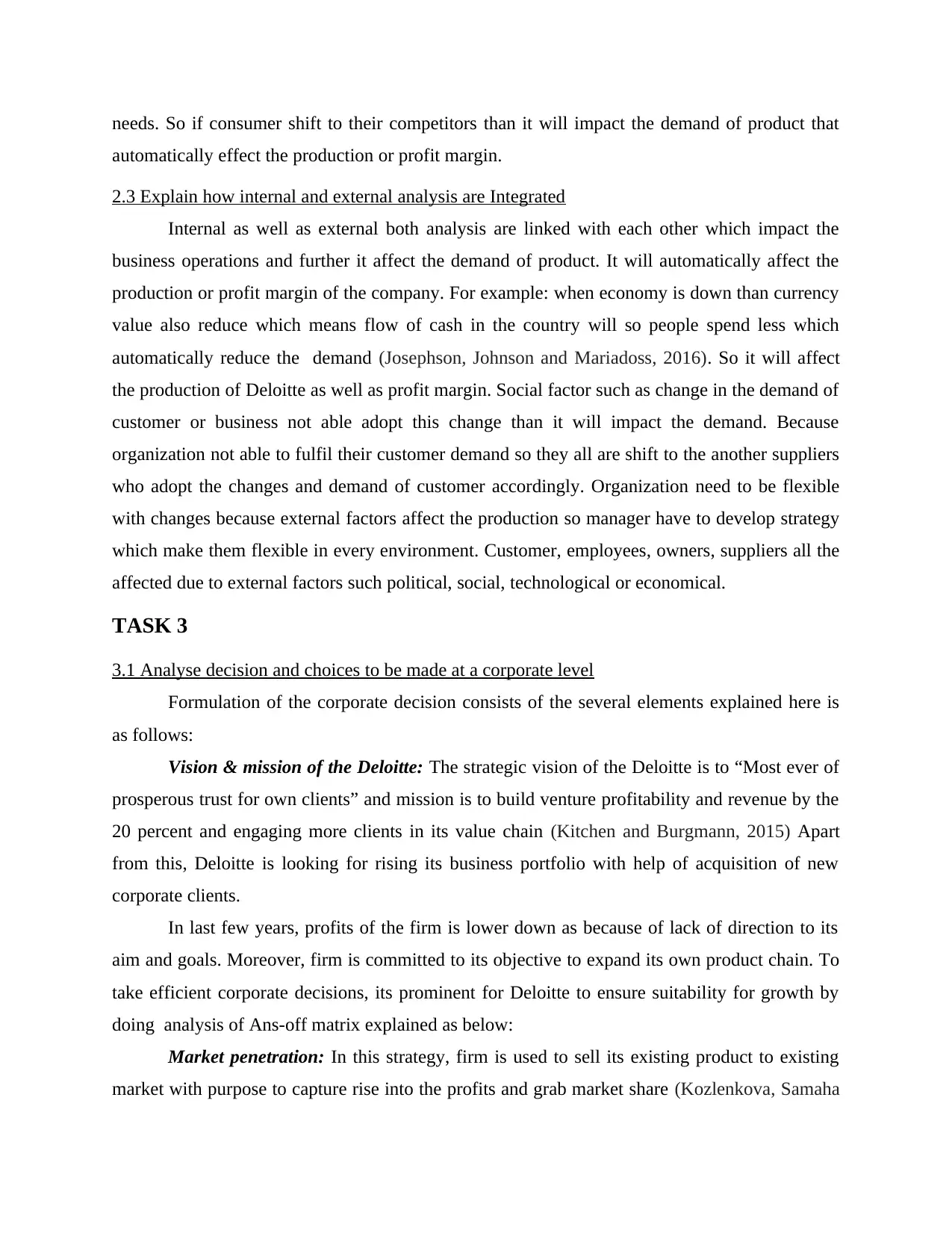
needs. So if consumer shift to their competitors than it will impact the demand of product that
automatically effect the production or profit margin.
2.3 Explain how internal and external analysis are Integrated
Internal as well as external both analysis are linked with each other which impact the
business operations and further it affect the demand of product. It will automatically affect the
production or profit margin of the company. For example: when economy is down than currency
value also reduce which means flow of cash in the country will so people spend less which
automatically reduce the demand (Josephson, Johnson and Mariadoss, 2016). So it will affect
the production of Deloitte as well as profit margin. Social factor such as change in the demand of
customer or business not able adopt this change than it will impact the demand. Because
organization not able to fulfil their customer demand so they all are shift to the another suppliers
who adopt the changes and demand of customer accordingly. Organization need to be flexible
with changes because external factors affect the production so manager have to develop strategy
which make them flexible in every environment. Customer, employees, owners, suppliers all the
affected due to external factors such political, social, technological or economical.
TASK 3
3.1 Analyse decision and choices to be made at a corporate level
Formulation of the corporate decision consists of the several elements explained here is
as follows:
Vision & mission of the Deloitte: The strategic vision of the Deloitte is to “Most ever of
prosperous trust for own clients” and mission is to build venture profitability and revenue by the
20 percent and engaging more clients in its value chain (Kitchen and Burgmann, 2015) Apart
from this, Deloitte is looking for rising its business portfolio with help of acquisition of new
corporate clients.
In last few years, profits of the firm is lower down as because of lack of direction to its
aim and goals. Moreover, firm is committed to its objective to expand its own product chain. To
take efficient corporate decisions, its prominent for Deloitte to ensure suitability for growth by
doing analysis of Ans-off matrix explained as below:
Market penetration: In this strategy, firm is used to sell its existing product to existing
market with purpose to capture rise into the profits and grab market share (Kozlenkova, Samaha
automatically effect the production or profit margin.
2.3 Explain how internal and external analysis are Integrated
Internal as well as external both analysis are linked with each other which impact the
business operations and further it affect the demand of product. It will automatically affect the
production or profit margin of the company. For example: when economy is down than currency
value also reduce which means flow of cash in the country will so people spend less which
automatically reduce the demand (Josephson, Johnson and Mariadoss, 2016). So it will affect
the production of Deloitte as well as profit margin. Social factor such as change in the demand of
customer or business not able adopt this change than it will impact the demand. Because
organization not able to fulfil their customer demand so they all are shift to the another suppliers
who adopt the changes and demand of customer accordingly. Organization need to be flexible
with changes because external factors affect the production so manager have to develop strategy
which make them flexible in every environment. Customer, employees, owners, suppliers all the
affected due to external factors such political, social, technological or economical.
TASK 3
3.1 Analyse decision and choices to be made at a corporate level
Formulation of the corporate decision consists of the several elements explained here is
as follows:
Vision & mission of the Deloitte: The strategic vision of the Deloitte is to “Most ever of
prosperous trust for own clients” and mission is to build venture profitability and revenue by the
20 percent and engaging more clients in its value chain (Kitchen and Burgmann, 2015) Apart
from this, Deloitte is looking for rising its business portfolio with help of acquisition of new
corporate clients.
In last few years, profits of the firm is lower down as because of lack of direction to its
aim and goals. Moreover, firm is committed to its objective to expand its own product chain. To
take efficient corporate decisions, its prominent for Deloitte to ensure suitability for growth by
doing analysis of Ans-off matrix explained as below:
Market penetration: In this strategy, firm is used to sell its existing product to existing
market with purpose to capture rise into the profits and grab market share (Kozlenkova, Samaha
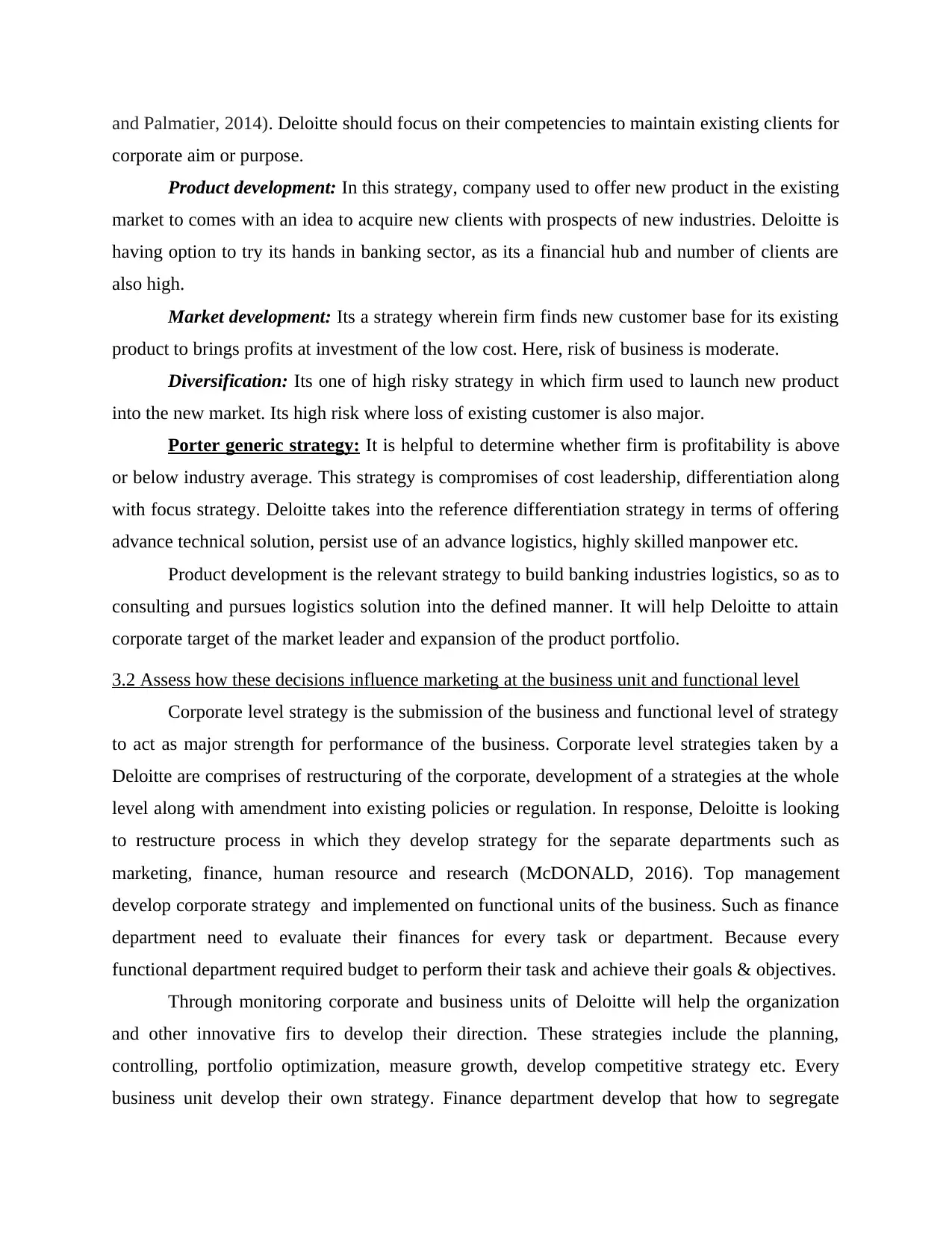
and Palmatier, 2014). Deloitte should focus on their competencies to maintain existing clients for
corporate aim or purpose.
Product development: In this strategy, company used to offer new product in the existing
market to comes with an idea to acquire new clients with prospects of new industries. Deloitte is
having option to try its hands in banking sector, as its a financial hub and number of clients are
also high.
Market development: Its a strategy wherein firm finds new customer base for its existing
product to brings profits at investment of the low cost. Here, risk of business is moderate.
Diversification: Its one of high risky strategy in which firm used to launch new product
into the new market. Its high risk where loss of existing customer is also major.
Porter generic strategy: It is helpful to determine whether firm is profitability is above
or below industry average. This strategy is compromises of cost leadership, differentiation along
with focus strategy. Deloitte takes into the reference differentiation strategy in terms of offering
advance technical solution, persist use of an advance logistics, highly skilled manpower etc.
Product development is the relevant strategy to build banking industries logistics, so as to
consulting and pursues logistics solution into the defined manner. It will help Deloitte to attain
corporate target of the market leader and expansion of the product portfolio.
3.2 Assess how these decisions influence marketing at the business unit and functional level
Corporate level strategy is the submission of the business and functional level of strategy
to act as major strength for performance of the business. Corporate level strategies taken by a
Deloitte are comprises of restructuring of the corporate, development of a strategies at the whole
level along with amendment into existing policies or regulation. In response, Deloitte is looking
to restructure process in which they develop strategy for the separate departments such as
marketing, finance, human resource and research (McDONALD, 2016). Top management
develop corporate strategy and implemented on functional units of the business. Such as finance
department need to evaluate their finances for every task or department. Because every
functional department required budget to perform their task and achieve their goals & objectives.
Through monitoring corporate and business units of Deloitte will help the organization
and other innovative firs to develop their direction. These strategies include the planning,
controlling, portfolio optimization, measure growth, develop competitive strategy etc. Every
business unit develop their own strategy. Finance department develop that how to segregate
corporate aim or purpose.
Product development: In this strategy, company used to offer new product in the existing
market to comes with an idea to acquire new clients with prospects of new industries. Deloitte is
having option to try its hands in banking sector, as its a financial hub and number of clients are
also high.
Market development: Its a strategy wherein firm finds new customer base for its existing
product to brings profits at investment of the low cost. Here, risk of business is moderate.
Diversification: Its one of high risky strategy in which firm used to launch new product
into the new market. Its high risk where loss of existing customer is also major.
Porter generic strategy: It is helpful to determine whether firm is profitability is above
or below industry average. This strategy is compromises of cost leadership, differentiation along
with focus strategy. Deloitte takes into the reference differentiation strategy in terms of offering
advance technical solution, persist use of an advance logistics, highly skilled manpower etc.
Product development is the relevant strategy to build banking industries logistics, so as to
consulting and pursues logistics solution into the defined manner. It will help Deloitte to attain
corporate target of the market leader and expansion of the product portfolio.
3.2 Assess how these decisions influence marketing at the business unit and functional level
Corporate level strategy is the submission of the business and functional level of strategy
to act as major strength for performance of the business. Corporate level strategies taken by a
Deloitte are comprises of restructuring of the corporate, development of a strategies at the whole
level along with amendment into existing policies or regulation. In response, Deloitte is looking
to restructure process in which they develop strategy for the separate departments such as
marketing, finance, human resource and research (McDONALD, 2016). Top management
develop corporate strategy and implemented on functional units of the business. Such as finance
department need to evaluate their finances for every task or department. Because every
functional department required budget to perform their task and achieve their goals & objectives.
Through monitoring corporate and business units of Deloitte will help the organization
and other innovative firs to develop their direction. These strategies include the planning,
controlling, portfolio optimization, measure growth, develop competitive strategy etc. Every
business unit develop their own strategy. Finance department develop that how to segregate
⊘ This is a preview!⊘
Do you want full access?
Subscribe today to unlock all pages.

Trusted by 1+ million students worldwide
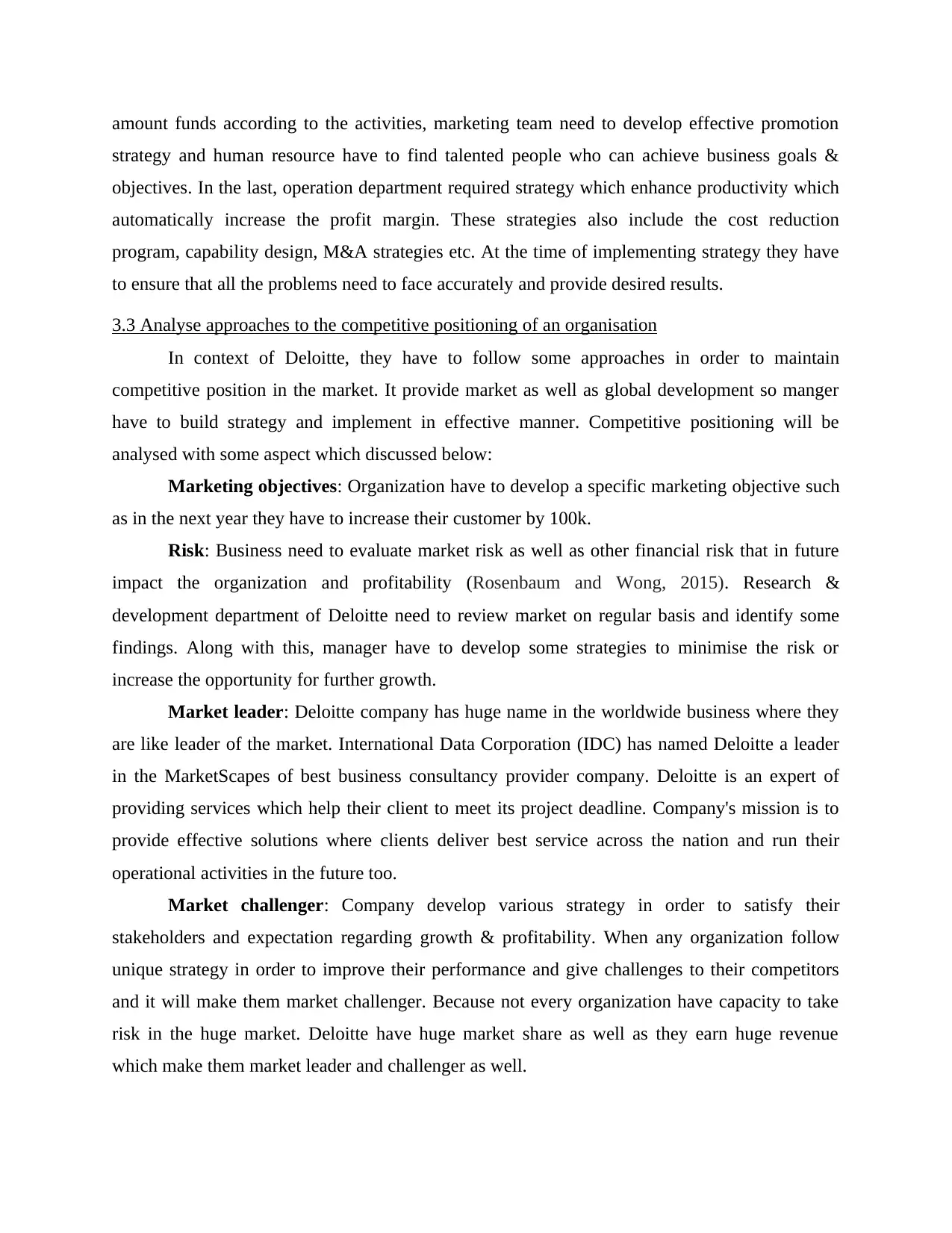
amount funds according to the activities, marketing team need to develop effective promotion
strategy and human resource have to find talented people who can achieve business goals &
objectives. In the last, operation department required strategy which enhance productivity which
automatically increase the profit margin. These strategies also include the cost reduction
program, capability design, M&A strategies etc. At the time of implementing strategy they have
to ensure that all the problems need to face accurately and provide desired results.
3.3 Analyse approaches to the competitive positioning of an organisation
In context of Deloitte, they have to follow some approaches in order to maintain
competitive position in the market. It provide market as well as global development so manger
have to build strategy and implement in effective manner. Competitive positioning will be
analysed with some aspect which discussed below:
Marketing objectives: Organization have to develop a specific marketing objective such
as in the next year they have to increase their customer by 100k.
Risk: Business need to evaluate market risk as well as other financial risk that in future
impact the organization and profitability (Rosenbaum and Wong, 2015). Research &
development department of Deloitte need to review market on regular basis and identify some
findings. Along with this, manager have to develop some strategies to minimise the risk or
increase the opportunity for further growth.
Market leader: Deloitte company has huge name in the worldwide business where they
are like leader of the market. International Data Corporation (IDC) has named Deloitte a leader
in the MarketScapes of best business consultancy provider company. Deloitte is an expert of
providing services which help their client to meet its project deadline. Company's mission is to
provide effective solutions where clients deliver best service across the nation and run their
operational activities in the future too.
Market challenger: Company develop various strategy in order to satisfy their
stakeholders and expectation regarding growth & profitability. When any organization follow
unique strategy in order to improve their performance and give challenges to their competitors
and it will make them market challenger. Because not every organization have capacity to take
risk in the huge market. Deloitte have huge market share as well as they earn huge revenue
which make them market leader and challenger as well.
strategy and human resource have to find talented people who can achieve business goals &
objectives. In the last, operation department required strategy which enhance productivity which
automatically increase the profit margin. These strategies also include the cost reduction
program, capability design, M&A strategies etc. At the time of implementing strategy they have
to ensure that all the problems need to face accurately and provide desired results.
3.3 Analyse approaches to the competitive positioning of an organisation
In context of Deloitte, they have to follow some approaches in order to maintain
competitive position in the market. It provide market as well as global development so manger
have to build strategy and implement in effective manner. Competitive positioning will be
analysed with some aspect which discussed below:
Marketing objectives: Organization have to develop a specific marketing objective such
as in the next year they have to increase their customer by 100k.
Risk: Business need to evaluate market risk as well as other financial risk that in future
impact the organization and profitability (Rosenbaum and Wong, 2015). Research &
development department of Deloitte need to review market on regular basis and identify some
findings. Along with this, manager have to develop some strategies to minimise the risk or
increase the opportunity for further growth.
Market leader: Deloitte company has huge name in the worldwide business where they
are like leader of the market. International Data Corporation (IDC) has named Deloitte a leader
in the MarketScapes of best business consultancy provider company. Deloitte is an expert of
providing services which help their client to meet its project deadline. Company's mission is to
provide effective solutions where clients deliver best service across the nation and run their
operational activities in the future too.
Market challenger: Company develop various strategy in order to satisfy their
stakeholders and expectation regarding growth & profitability. When any organization follow
unique strategy in order to improve their performance and give challenges to their competitors
and it will make them market challenger. Because not every organization have capacity to take
risk in the huge market. Deloitte have huge market share as well as they earn huge revenue
which make them market leader and challenger as well.
Paraphrase This Document
Need a fresh take? Get an instant paraphrase of this document with our AI Paraphraser
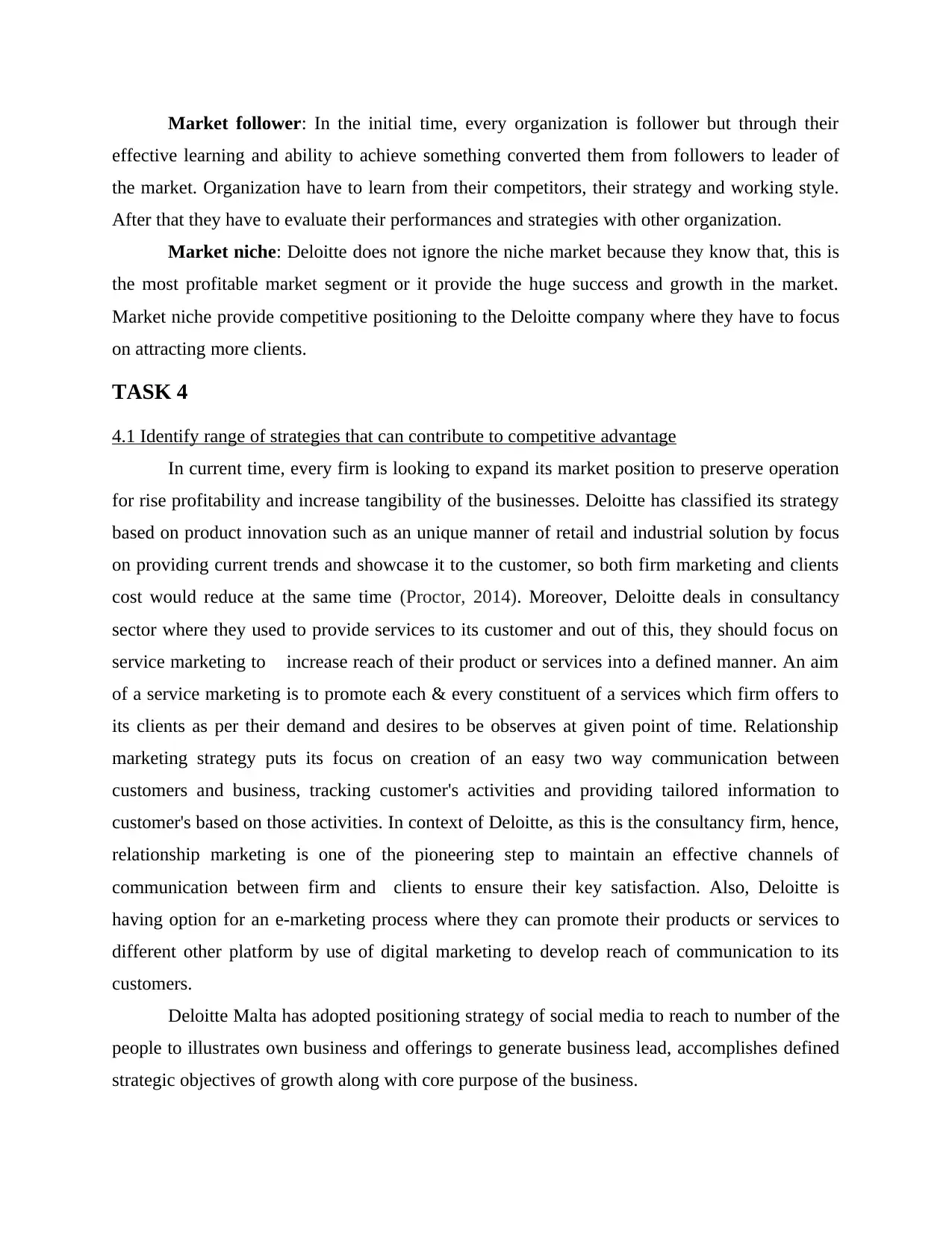
Market follower: In the initial time, every organization is follower but through their
effective learning and ability to achieve something converted them from followers to leader of
the market. Organization have to learn from their competitors, their strategy and working style.
After that they have to evaluate their performances and strategies with other organization.
Market niche: Deloitte does not ignore the niche market because they know that, this is
the most profitable market segment or it provide the huge success and growth in the market.
Market niche provide competitive positioning to the Deloitte company where they have to focus
on attracting more clients.
TASK 4
4.1 Identify range of strategies that can contribute to competitive advantage
In current time, every firm is looking to expand its market position to preserve operation
for rise profitability and increase tangibility of the businesses. Deloitte has classified its strategy
based on product innovation such as an unique manner of retail and industrial solution by focus
on providing current trends and showcase it to the customer, so both firm marketing and clients
cost would reduce at the same time (Proctor, 2014). Moreover, Deloitte deals in consultancy
sector where they used to provide services to its customer and out of this, they should focus on
service marketing to increase reach of their product or services into a defined manner. An aim
of a service marketing is to promote each & every constituent of a services which firm offers to
its clients as per their demand and desires to be observes at given point of time. Relationship
marketing strategy puts its focus on creation of an easy two way communication between
customers and business, tracking customer's activities and providing tailored information to
customer's based on those activities. In context of Deloitte, as this is the consultancy firm, hence,
relationship marketing is one of the pioneering step to maintain an effective channels of
communication between firm and clients to ensure their key satisfaction. Also, Deloitte is
having option for an e-marketing process where they can promote their products or services to
different other platform by use of digital marketing to develop reach of communication to its
customers.
Deloitte Malta has adopted positioning strategy of social media to reach to number of the
people to illustrates own business and offerings to generate business lead, accomplishes defined
strategic objectives of growth along with core purpose of the business.
effective learning and ability to achieve something converted them from followers to leader of
the market. Organization have to learn from their competitors, their strategy and working style.
After that they have to evaluate their performances and strategies with other organization.
Market niche: Deloitte does not ignore the niche market because they know that, this is
the most profitable market segment or it provide the huge success and growth in the market.
Market niche provide competitive positioning to the Deloitte company where they have to focus
on attracting more clients.
TASK 4
4.1 Identify range of strategies that can contribute to competitive advantage
In current time, every firm is looking to expand its market position to preserve operation
for rise profitability and increase tangibility of the businesses. Deloitte has classified its strategy
based on product innovation such as an unique manner of retail and industrial solution by focus
on providing current trends and showcase it to the customer, so both firm marketing and clients
cost would reduce at the same time (Proctor, 2014). Moreover, Deloitte deals in consultancy
sector where they used to provide services to its customer and out of this, they should focus on
service marketing to increase reach of their product or services into a defined manner. An aim
of a service marketing is to promote each & every constituent of a services which firm offers to
its clients as per their demand and desires to be observes at given point of time. Relationship
marketing strategy puts its focus on creation of an easy two way communication between
customers and business, tracking customer's activities and providing tailored information to
customer's based on those activities. In context of Deloitte, as this is the consultancy firm, hence,
relationship marketing is one of the pioneering step to maintain an effective channels of
communication between firm and clients to ensure their key satisfaction. Also, Deloitte is
having option for an e-marketing process where they can promote their products or services to
different other platform by use of digital marketing to develop reach of communication to its
customers.
Deloitte Malta has adopted positioning strategy of social media to reach to number of the
people to illustrates own business and offerings to generate business lead, accomplishes defined
strategic objectives of growth along with core purpose of the business.
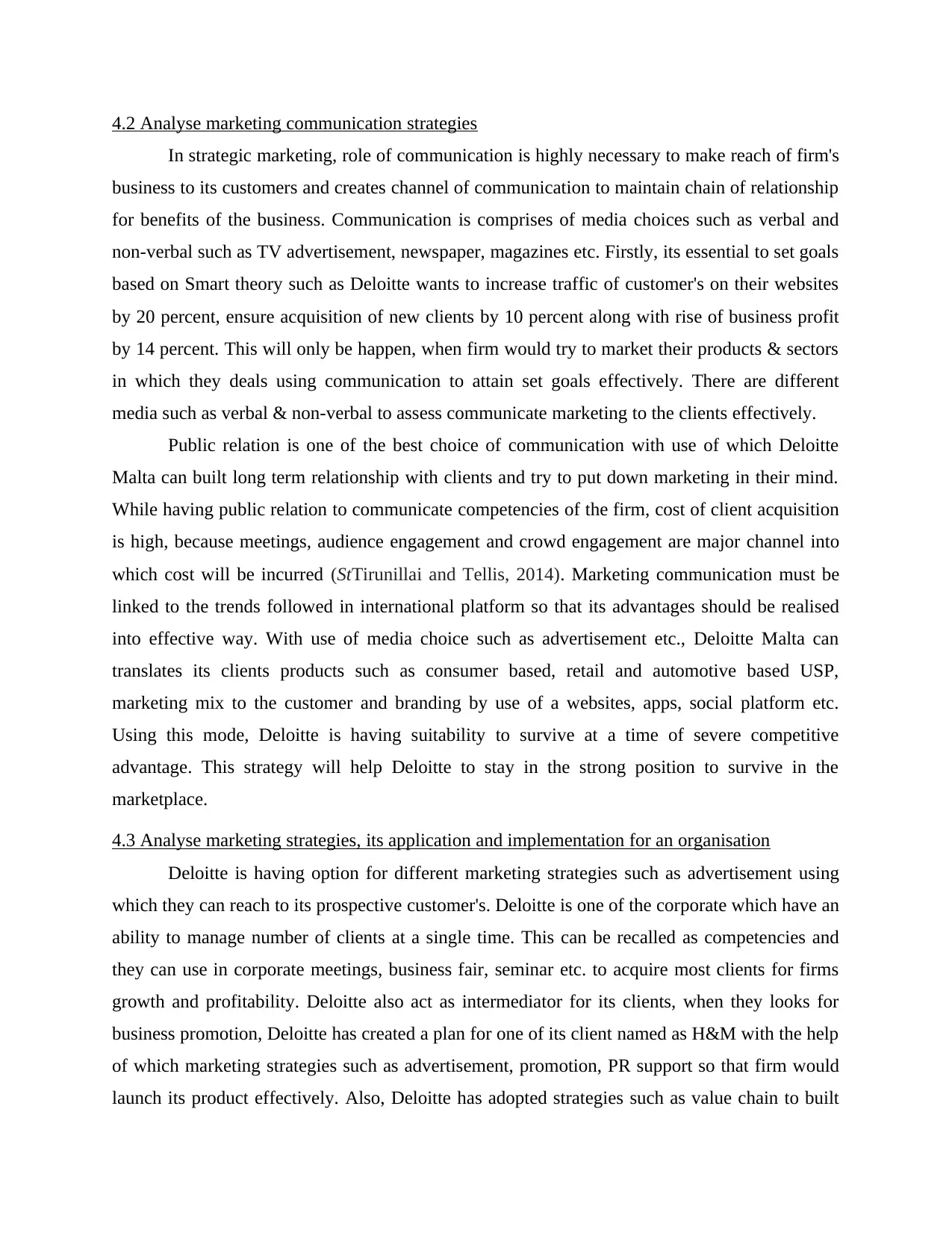
4.2 Analyse marketing communication strategies
In strategic marketing, role of communication is highly necessary to make reach of firm's
business to its customers and creates channel of communication to maintain chain of relationship
for benefits of the business. Communication is comprises of media choices such as verbal and
non-verbal such as TV advertisement, newspaper, magazines etc. Firstly, its essential to set goals
based on Smart theory such as Deloitte wants to increase traffic of customer's on their websites
by 20 percent, ensure acquisition of new clients by 10 percent along with rise of business profit
by 14 percent. This will only be happen, when firm would try to market their products & sectors
in which they deals using communication to attain set goals effectively. There are different
media such as verbal & non-verbal to assess communicate marketing to the clients effectively.
Public relation is one of the best choice of communication with use of which Deloitte
Malta can built long term relationship with clients and try to put down marketing in their mind.
While having public relation to communicate competencies of the firm, cost of client acquisition
is high, because meetings, audience engagement and crowd engagement are major channel into
which cost will be incurred (StTirunillai and Tellis, 2014). Marketing communication must be
linked to the trends followed in international platform so that its advantages should be realised
into effective way. With use of media choice such as advertisement etc., Deloitte Malta can
translates its clients products such as consumer based, retail and automotive based USP,
marketing mix to the customer and branding by use of a websites, apps, social platform etc.
Using this mode, Deloitte is having suitability to survive at a time of severe competitive
advantage. This strategy will help Deloitte to stay in the strong position to survive in the
marketplace.
4.3 Analyse marketing strategies, its application and implementation for an organisation
Deloitte is having option for different marketing strategies such as advertisement using
which they can reach to its prospective customer's. Deloitte is one of the corporate which have an
ability to manage number of clients at a single time. This can be recalled as competencies and
they can use in corporate meetings, business fair, seminar etc. to acquire most clients for firms
growth and profitability. Deloitte also act as intermediator for its clients, when they looks for
business promotion, Deloitte has created a plan for one of its client named as H&M with the help
of which marketing strategies such as advertisement, promotion, PR support so that firm would
launch its product effectively. Also, Deloitte has adopted strategies such as value chain to built
In strategic marketing, role of communication is highly necessary to make reach of firm's
business to its customers and creates channel of communication to maintain chain of relationship
for benefits of the business. Communication is comprises of media choices such as verbal and
non-verbal such as TV advertisement, newspaper, magazines etc. Firstly, its essential to set goals
based on Smart theory such as Deloitte wants to increase traffic of customer's on their websites
by 20 percent, ensure acquisition of new clients by 10 percent along with rise of business profit
by 14 percent. This will only be happen, when firm would try to market their products & sectors
in which they deals using communication to attain set goals effectively. There are different
media such as verbal & non-verbal to assess communicate marketing to the clients effectively.
Public relation is one of the best choice of communication with use of which Deloitte
Malta can built long term relationship with clients and try to put down marketing in their mind.
While having public relation to communicate competencies of the firm, cost of client acquisition
is high, because meetings, audience engagement and crowd engagement are major channel into
which cost will be incurred (StTirunillai and Tellis, 2014). Marketing communication must be
linked to the trends followed in international platform so that its advantages should be realised
into effective way. With use of media choice such as advertisement etc., Deloitte Malta can
translates its clients products such as consumer based, retail and automotive based USP,
marketing mix to the customer and branding by use of a websites, apps, social platform etc.
Using this mode, Deloitte is having suitability to survive at a time of severe competitive
advantage. This strategy will help Deloitte to stay in the strong position to survive in the
marketplace.
4.3 Analyse marketing strategies, its application and implementation for an organisation
Deloitte is having option for different marketing strategies such as advertisement using
which they can reach to its prospective customer's. Deloitte is one of the corporate which have an
ability to manage number of clients at a single time. This can be recalled as competencies and
they can use in corporate meetings, business fair, seminar etc. to acquire most clients for firms
growth and profitability. Deloitte also act as intermediator for its clients, when they looks for
business promotion, Deloitte has created a plan for one of its client named as H&M with the help
of which marketing strategies such as advertisement, promotion, PR support so that firm would
launch its product effectively. Also, Deloitte has adopted strategies such as value chain to built
⊘ This is a preview!⊘
Do you want full access?
Subscribe today to unlock all pages.

Trusted by 1+ million students worldwide
1 out of 15
Related Documents
Your All-in-One AI-Powered Toolkit for Academic Success.
+13062052269
info@desklib.com
Available 24*7 on WhatsApp / Email
![[object Object]](/_next/static/media/star-bottom.7253800d.svg)
Unlock your academic potential
Copyright © 2020–2025 A2Z Services. All Rights Reserved. Developed and managed by ZUCOL.





